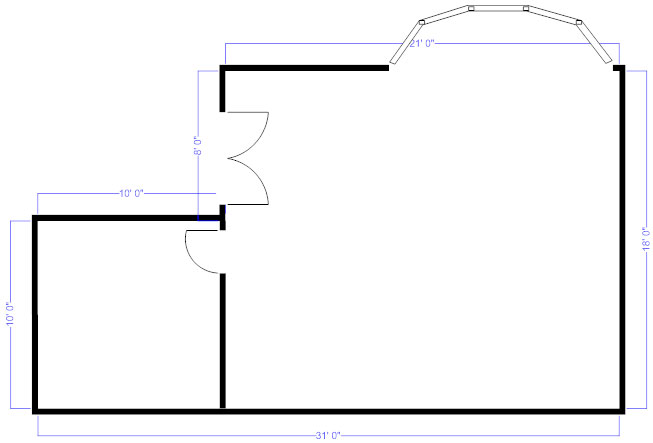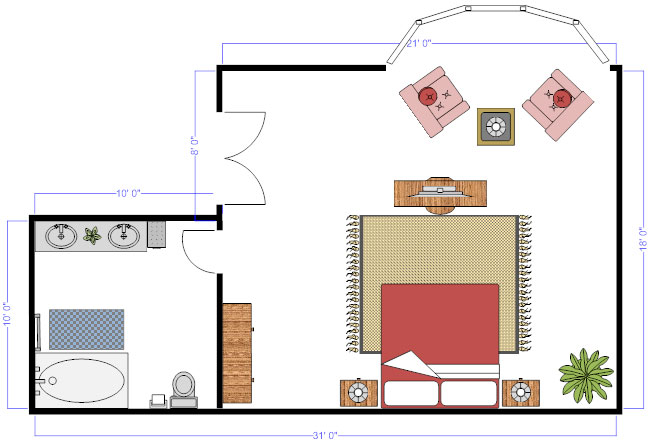What is a Floor Plan?

What is a Floor Plan?
A floor plan is a scaled diagram of a room or building viewed from above. The floor plan may depict an entire building, one floor of a building, or a single room. It may also include measurements, furniture, appliances, or anything else necessary to the purpose of the plan.
Floor plans are useful to help design furniture layout, wiring systems, and much more. They’re also a valuable tool for real estate agents and leasing companies in helping sell or rent out a space.
The Importance of Floor Plan Design
Floor plans are essential when designing and building a home. A good floor plan can increase the enjoyment of the home by creating a nice flow between spaces and can even increase its resale value.
What are the key characteristics of a good floor plan when designing your house?
- Versatile and flexible. Make sure in the future an office can easily be turned into a child’s bedroom whether for your family or a future buyer’s.
- Ideal room layout. Make sure bedrooms are far from entertaining spaces. Bathrooms shouldn’t face common entertainment spaces like dining rooms or living rooms. Most people will like if the kitchen opens to the dining or living rooms so whoever is cooking can still interact with guests or keep an eye on the kids playing.
- Size matters. Whenever designing any room or hallway, think about how many people will be in that space at one time. Do they have room to move around? Is there room for furniture to accommodate all the planned activities?
- Fits your priorities and lifestyle. If entertaining is important, make sure there’s a good flow from the kitchen to an outside space and living room. If you work from home, make sure your office gets ideal light and is perhaps in a quiet location. When you do laundry, is it ok if you have to climb three floors to get from your master bedroom to the laundry room?
- Find the balance between architectural details and practical considerations. Think about the safety of kids, cleaning, heating and cooling bill before falling in love with some majestic staircase or floor to ceiling windows.
Marketing and communicating with floor plans
Floor plans are also key in communicating the flow of your space to potential buyers or renters.

Rightmove released a study in 2013 that suggests that real estate buyers consider floor plans not just nice to have, but essential when looking at properties. One in five said they would ignore a property without a floor plan. They also rated floor plans more important than photos and the description of the property. On the flip side, when sellers consider hiring a real estate agent, Rightmove found that 42% wouldn’t hire an agent that didn’t offer a floor plan.
Adding a floor plan to a real estate listing can increase click-through from buyers by 52%.
You can also use a floor plan to communicate with contractors and vendors about an upcoming remodeling project.
How to Draw a Floor Plan
There are a few basic steps to creating a floor plan:
- Choose an area. Determine the area to be drawn. If the building already exists, decide how much (a room, a floor, or the entire building) of it to draw. If the building does not yet exist, brainstorm designs based on the size and shape of the location on which to build.
- Take measurements. If the building exists, measure the walls, doors, and pertinent furniture so that the floor plan will be accurate. If the layout is being created for an entirely new area, be sure that the total area will fit where it is to be built. It is advisable to examine buildings built in similar areas to use as an estimate for this floor plan. Learn more about how to measure and draw your floor plan to scale.

- Draw walls. Add walls for each room of the building, taking care to draw them to scale.
- Add architectural features. Begin adding features to the space by including the unchangeable things, like the doors and windows, as well as the refrigerator, dishwasher, dryer, and other important appliances that must be placed in a specific location.
- Add furniture. Add furniture if the floor plan calls for it.

Floor Plan Examples
The best way to understand floor plans is to look at some examples of floor plans.
Click on any of these floor plans included in Smart Draw and edit them:










[…] just drawing floor plans, a skilled designer understands how different spaces interact. They consider factors such as […]
[…] who review floor plans before visiting a property are more likely to be genuinely interested. They can assess whether the […]
[…] a custom home requires making numerous decisions, from floor plans to doorknobs, which can become overwhelming. The need to decide on every detail can lead to […]
[…] yet daunting task. One of the most crucial steps in this process is creating a well-thought-out floor plan that maximizes both functionality and aesthetics. This is where a professional floor plan designer […]
%%CHANGEAUTHOR%% set %%AUTHOR%% as the author of the ticket